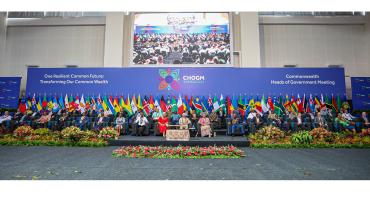Sports and development experts are meeting in London to discuss how sport could accelerate the achievement of education and health goals in the Commonwealth.

The Commonwealth Advisory Body on Sport (CABOS) - an independent body providing advice on sport policy issues and Sport for Development and Peace (SDP) – began a two-day meeting at the Commonwealth Secretariat’s headquarters in Marlborough House yesterday. Sport for Development and Peace is about using sport as a tool to advance development and peace objectives.
In his opening remarks, Commonwealth Secretary-General Kamalesh Sharma observed that SDP has become an increasingly important component of the work of the Secretariat’s Youth Affairs Division. He welcomed CABOS’ role in considering efforts to protect the integrity of sport and in advancing the Commonwealth’s work in SDP.
Mr Sharma said: “When we consider the Commonwealth family, sport is a significant component of our shared identity.
“I look forward to your recommendations on how CABOS may be able to contribute to the emerging international initiatives. In particular in highlighting how sport integrity issues impact on small states, of which there are 44 among the Commonwealth’s membership.”
The Secretary-General also referred to the Commonwealth Guidelines on Advancing Development though Sport, a Secretariat publication which is being used in Commonwealth countries including Barbados, Rwanda and Sri Lanka to assist in developing national SDP action plans.
Recognition of the contribution sport-based approaches can make to development and peace-building objectives have grown markedly over the last ten years. While new global poverty eradication goals for post-2015 are being developed, the Commonwealth will increase its focus on how sport and play can contribute to health and education targets in member countries.
CABOS will examine how they can move beyond advocacy and turn governments’ policies on sports initiatives into action, and the role of governments in framing SDP policies and supporting, monitoring and evaluating it.
CABOS will also identify opportunities to enhance connectivity and collaboration between Commonwealth governments, civil society organisations and the Commonwealth Games movement to strengthen sport and the use of SDP.
CABOS Interim Chair, Professor Bruce Kidd, observed that the issue of integrity in sport also requires urgent action on the part of CABOS. This includes sport governance, illegal and irregular sport betting and match-fixing, and safeguarding sport participants.
CABOS’ membership includes 13 sport and development experts and senior sports officials from across the Commonwealth. Young people are contributing to the policy discussions through the Commonwealth SDP Youth Working Group.



